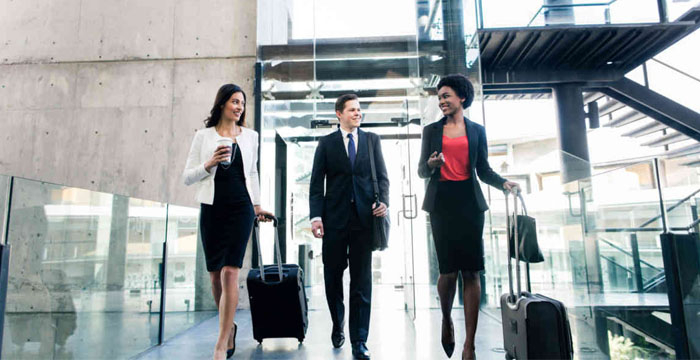
If you do a lot of traveling, then you've probably realized that taking a look at the statistics once in a while is a good idea. This helps you to understand the economy, the market, and what's going on in the travel space.
Let's be real for a second.
Our economy is in a weird place.
Just to be honest, the world economy is in a weird place.
And the best way to make the most of your travel budget is to keep yourself aware of all of the statistics associated with travel, business, and your ability to get from place to place in a functional and affordable manner. So in this blog post, we're going to share our 5 favorite business travel statistics that you should definitely know about. These fascinating statistics will help to paint a more accurate picture of what travel is actually going to look like, from this year moving forward. Hey, it's already been a crazy year. But buckle in—because things might not get any calmer.
1. Hotel Accommodations Take The Largest Piece Of The Corporate Travel Spending Pie
If you do much corporate traveling, then you probably already know that this is true. However, it's a really fascinating statistic when you take into account exactly what people are spending their money on, and what is necessary for a successful business trip.
According to a report by Hotel Engine, hotel accommodations represent 34% of the business travel expense breakdown. In other words, companies are spending over a quarter of their business travel budgets on hotel accommodations. This just goes to show that if you can save some money on hotels by getting better deals, you're probably going to save quite a bit of money on travel overall.
2. Half Of the Employees Don't Follow Company Travel Policies
This is another pretty fascinating statistic that every travel manager should be aware of. According to that same report by Hotel Engine, it's estimated that 50% of employees say they do not follow their company's travel policies.
In other words, if your company is spending a certain amount of money on travel—and if your budget is reliant on employees spending money the way your travel policy dictates it be spent—it's possible that employees just aren't following it, and that you're actually racking up a bigger bill than might be necessary.
3. The Overwhelming Majority Of Employees Love To Travel

If you had any doubts about whether or not your employees actually liked to travel for work, this statistic may help you to achieve some peace of mind. Once again, referring back to that Hotel Engine report—75% of millennials view business travel as a major perk, and 65% of millennials consider it a status symbol.
Hey, next time you feel bad about sending that millennial salesman of yours on a business trip, think twice about feeling guilty. This is probably going to be the best part of the work year for them.
4. More Millennials Than Ever Are Turning Business Travel Into Bleisure Travel
Nowadays, the term ‘bleisure,’ which basically means a blend of business and leisure, is more popular than ever. And statistics back this up. According to a survey conducted by Forbes, 69% of millennials said they prefer to turn business trips into bleisure travel. In other words, millennials are actually enjoying their business trips more because they're packing more leisure than ever into their schedules alongside their work obligations.
This is great news if your employees tend to perform well in the field. It means that they're probably doing something right. This might be bad news, however, if you're getting lackluster results from your team. It could be a sign that they're taking leisure a little bit too seriously.
5. The Most Expensive Cities For Business Travel
This statistic probably isn't going to surprise you. However, the official data on the latest, most expensive cities for business travel puts New York City, Washington D.C., San Francisco, and Los Angeles right at the top. If you plan to send teams to any of these cities for business travel, you can pretty much plan on spending more money than you would if you were going to be sending them almost anywhere else in the United States.
Of course, there are also some cities outside of the U.S. that really compete when it comes to being expensive for travel—even when taking top American cities into account. Hong Kong, Geneva, Zurich, and Paris are just a couple of examples.
Conclusion
There you have it.
5 of our favorite, most fascinating business travel statistics for the upcoming year.
Here's the thing:
Travel needs to happen.
The best that you can do is to find a way to make it affordable and to make it work the best it can for your business.
Understanding the market is the first piece of the puzzle.
Good luck!
Now get out there and make it happen.













_1691155440.jpg)
